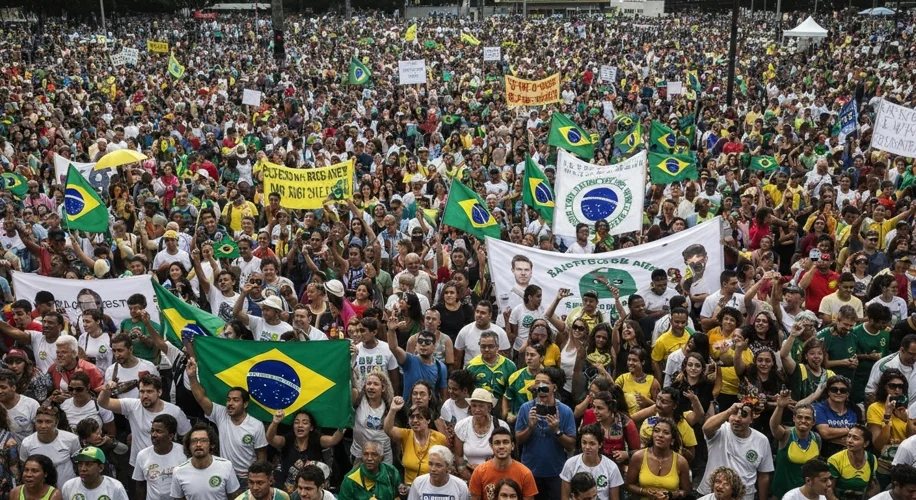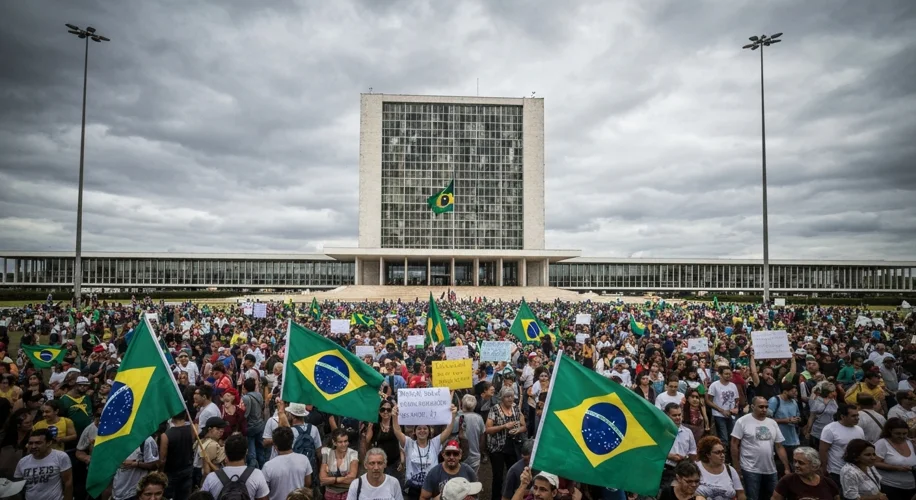As September 8th, 2025, dawns, Brazil finds itself at a familiar crossroads, its political landscape mirroring the turbulent currents that have shaped its recent past. The air crackles with anticipation as supporters of former President Jair Bolsonaro prepare to take to the streets, their rallying cry echoing a fierce, unwavering defense of national sovereignty. This mobilization, occurring on the eve of a significant judicial verdict, underscores a deep-seated sentiment that has permeated Brazilian society, a potent brew of patriotism, cultural identity, and a wary eye toward external influences.
To understand the fervor of Bolsonaro’s base, one must first appreciate the socio-political climate he cultivated. Emerging from a period of economic instability and political scandal, Bolsonaro tapped into a wellspring of discontent, promising a return to traditional values, a strong stance against crime, and, crucially, a reassertion of Brazilian sovereignty. His supporters, often characterized as a mix of evangelicals, the military, agricultural elites, and a segment of the working class disillusioned with established parties, saw in him a bulwark against what they perceived as a creeping liberalism and globalist agenda that threatened to erode Brazil’s unique identity.

The very notion of sovereignty has become a potent symbol in Brazil’s political discourse. For Bolsonaro’s followers, it represents an unassailable right to self-determination, free from perceived interference from international bodies, foreign powers, or even global economic forces. This sentiment is often amplified by a nationalistic pride, a deep-seated belief in Brazil’s potential as a global player, and a suspicion of ideologies perceived as foreign impositions. When Bolsonaro spoke of “Brazil above everything, God above everyone,” it resonated with those who felt their nation’s interests and cultural heritage were under siege.
Meanwhile, in a stark contrast, President Luiz Inácio Lula da Silva, a figure who has navigated Brazil’s complex political waters for decades, has also been a vocal proponent of national sovereignty. However, his emphasis often carries a different nuance. Lula’s vision of sovereignty frequently intersects with a call for greater autonomy on the global stage, particularly in challenging established economic and political hierarchies. His past pronouncements, particularly those contrasting Brazil’s interests with those of former U.S. President Donald Trump, highlight a strategy of projecting Brazilian strength and independence by navigating international relations on its own terms. Lula’s approach often involves fostering alliances with other developing nations and advocating for a multipolar world, where Brazil plays a significant role.
“We have to be sovereign. We have to be able to decide our own future,” Lula might have stated in a recent address, underscoring his commitment to an independent foreign policy. This is a sentiment that, while shared in principle by Bolsonaro’s supporters, is often viewed through a different lens: Lula’s perceived alignment with globalist aspirations, his past economic policies, and his approach to social issues often draw criticism from the right.
The upcoming verdict looms large, casting a long shadow over these deeply held convictions. For Bolsonaro’s supporters, any outcome perceived as unjust or politically motivated will likely be interpreted as a direct assault on their vision of a sovereign Brazil, potentially fueling further protests and deepening the existing political chasm. The judicial system, often a target of partisan rhetoric, finds itself under intense scrutiny, its impartiality tested by the weight of public expectation and political polarization.
The impact of these ongoing political currents extends far beyond Brazil’s borders. The ebb and flow of its commitment to sovereignty, the internal debates over national identity, and the direction of its foreign policy all send ripples across the global stage. As Brazil navigates these complex internal dynamics, the world watches, keenly aware that the nation’s commitment to its own path will continue to shape its destiny and influence the broader geopolitical landscape. The echoes of sovereignty, whether amplified by Bolsonaro’s passionate base or articulated through Lula’s calls for global autonomy, continue to define Brazil’s place in the 21st century.

